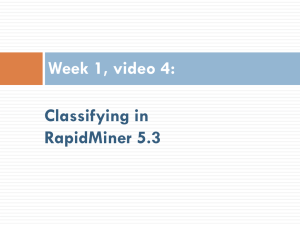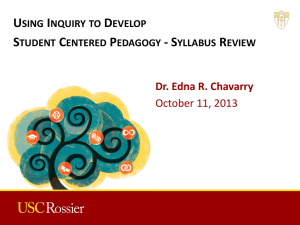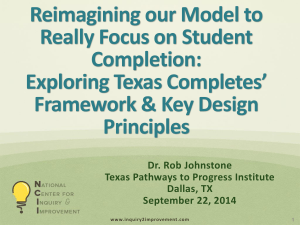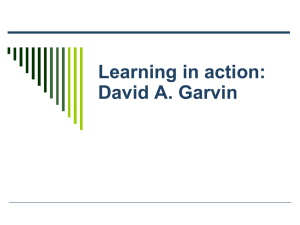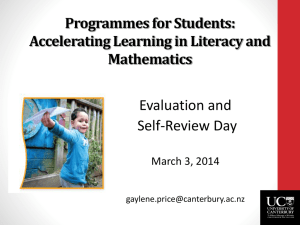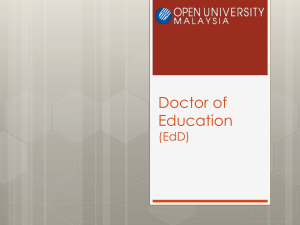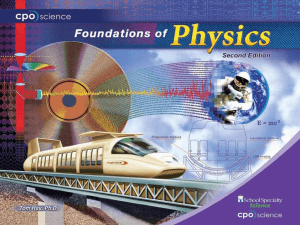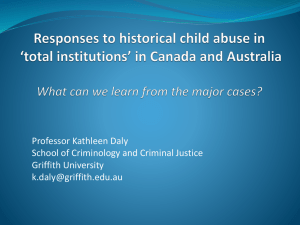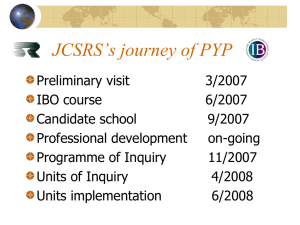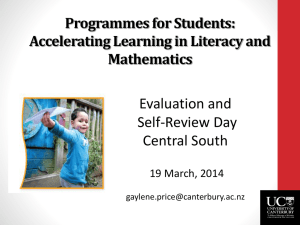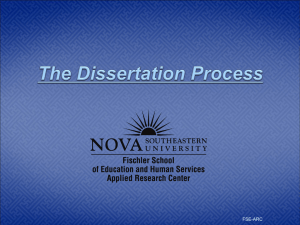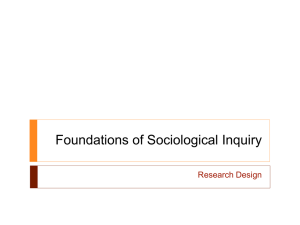Dissertation Models
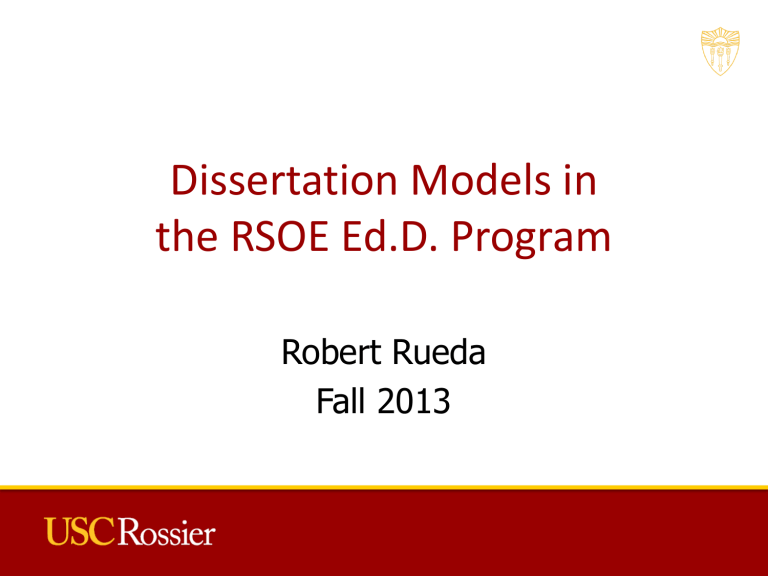
Dissertation Models in the RSOE Ed.D. Program
Robert Rueda
Fall 2013
Our Program Goal: What Are We Trying to
Achieve?
“Scholarly Practitioners blend practical wisdom with professional skills and knowledge to name, frame, and solve problems of practice. They use practical research and applied theories as tools for change because they understand the importance of equity and social justice. They disseminate their work in multiple ways, and they have an obligation to resolve problems of practice by collaborating with key stakeholders, including the university, the educational institution, the community, and individuals .” (CPED website)
Two Key Components Related to the Goal:
Purposes of the EdD
What are key components of the EdD that we expect students to be proficient in?
– Problem solving
• framing problems of practice that are concrete, significant, and solvable, and tied to the mission and priorities of the organization
• Diagnosing and verifying underlying causes
• Leveraging research-based solutions
– Inquiry
• Understanding and critically evaluating research & evidence
• Ability to investigate problems of practice, their causes, and solutions, with a variety of methods and approaches as appropriate
Inquiry: The Skills & Knowledge Needed for
Problem-Solving
“Inquiry as Practice is the process of posing significant questions that focus on complex problems of practice. By using various research, theories, and professional wisdom, scholarly practitioners design innovative solutions to address the problems of practice. At the center of Inquiry of Practice is the ability to use data to understand the effects of innovation. As such, Inquiry of Practice requires the ability to gather, organize, judge, aggregate, and analyze situations, literature, and data with a critical lens” (CPED website)
How Are These Competencies
Expressed?
• Dissertations on problems of practice
• In the USC Program, we would expect dissertations of practice and capstones to exhibit the following characteristics
– Addresses an educational issue
– Focused on some aspect of urban education
– Focuses on a significant problem of practice
– Demonstrates proficiency in Inquiry skills and methods as appropriate to the problem
What is the Dissertation of Practice or
Capstone?
“Expectation is that students will prepare a scholarly project that demonstrates a synthesis of the student’s abilities, lay the groundwork for future practice scholarship, and demonstrate mastery of ability to frame and critically inquire in to a significant educational problem of practice.” (CPED website)
What is a “Problem of Practice”?
A problem of practice is a problem or issue that emerges from an educational setting and whose resolution is significant to the practitioners in that setting or to those they serve or engage with. In the USC context, the focus is on urban environments, and the program admits students from K-12, higher education, and non-school organizational, agency, and other work settings where education is a focus, and thus the scope of problems of practice is wide. These problems of practice are distinguishable from problems that arise from a review of gaps in the research literature on an educational topic, or problems that are based primarily on extending current theory. This definition does not suggest that problems of practice are not of interest to theoreticians or that they are not amenable to the application of theory, nor does it suggest that theoretical problems are devoid of practical application. Rather, the distinction is based on the primary focus and emphasis.
A Range Of Inquiry Types
Research Types in the Ed. D. Program
Purpose
Theory Explanatory or Interpretive
Origin of a Problem Scientific Literature
Researcher’s Role Expert
Practitioner’s Role Consumer of Research
Benefit to Participants Minimal
Methodology Qualitative or Quantitative
Level
Case Study
Client
Perspective
Research Sample
New Knowledge
Research (Ph. D. Model)
Evaluation and
Problem Solving
Research (Ed. D.)
Generalizable/Transferable Knowledge Improvement of Practice
Individual(s) or Organization (s)
Sometimes
Scholars in Like Disciplines
Outsider
Random or Purposeful
Collaboration
Generalizability
None or a Few Other Experts
Defining Characteristic
Standard for Judging Intellectual Rigor
Goal
Dissemination
Publishable Article
Refereed Paper or Article
Knowledge Type Universal
Need IRB Approval? Yes
Theory of Action
Practice
Facilitator
Producer of Research
Yes
Mixed
A Single Organization
Promising Practices Research
(Ed. D.)
Identify Promising Practices
Theory of Action
Practice
Observer
Producer of Research
Minimal
Mixed
A Single Organization
Always
Scholars and Practitioners
Always
Local Community
Insider or Participant
Local Setting
Many Collaborators
Minimal or None
Outsider
Purposeful
None or a Few Other Experts
Transferable to similar settings
Impact in a Local Setting Quality of Extrapolations
Improvement @ Local level Transferable New Knowledge
Oral or Written Report (s) Oral or Written Report (s)
Local
No, NFHSR
Transferable Extrapolations
Yes
Some Dissertation of Practice Format Types
• Consultancy model
• Thematic
• Traditional 5-chapter
• Three article design
• Policy brief/analysis
• Evaluation
• Other
Goal
How Do the EdD and Phd Degrees Differ?
DNP PhD
Preparation of leaders in practice Preparation of nurse scientists
Research focus Application of research to practice, innovations in care
Discovery of new knowledge
Outcome Leadership in practice Careers in academia and other research-intensive environments
Hallmark of educational program Mentorship in the highest level of nursing practice
Mentorship in research
Final program product Practice-oriented final scholarly project
Dissertation based on original research
Inquiry as Common Ground
• It is an oversimplification to say that the PhD is a research degree and the EdD is a practice – Inquiry is important in both
• Inquiry in the service of generating new generalizable knowledge and theory development is a primary focus of the PhD
• Inquiry in the service of addressing or solving a significant problem of practice is a primary focus of the EdD
What are the current models?
• In the USC program, we employ a thematic group option
• While a small number of students do independent work with a chair, the majority of students participate in a thematic group
• This format was created both for reasons of efficiency but to build on the social nature of learning and collaboration skills which will be needed in future career work
• Some of the current configurations are outlined below
Single Chair, Individual Study, Not Connected to
Thematic Group
Chair
Individual
Study
Thematic Group - Single Chair, Common Theme,
Different Research Questions within the Theme
Common
Theme
Individual
Study 1
Individual
Study 1
Individual
Study 1
Individual
Study 1
Individual
Study 1
Product = single author dissertation
Thematic Group - Single Chair, Problem-Solving
Consultant Approach, Team Structure
Member
1
Member
1
Member
1
Team Team
Team
Member
2
Member
3
Member
2
Member
3
Member
2
Member
3
Product = Report with single-author and joint author sections, main target is school,
District, or organization, may include supplemental material such as Powerpoints
Single Chair, Single Topic, Common
Questions & Methodology, Individual
Studies
Single Common Topic
Individual
Study 1
Individual
Study 1
Individual
Study 1
Individual
Study 1
Individual
Study 1
Product = single author dissertations
Non-negotiable Elements for Any
Dissertation of Practice or Capstone
• The work includes a problem statement and framing of the approach, which establishes the rationale and significance of the work
• The current literature is used as a foundation for the work and approach at key points: framing the problem, synthesizing what is known about the problem, and informing the solutions and implications of the work
• The work is systematic and represents sufficient effort to serve as a capstone
• The product represents a contribution to urban educational practice
• The product and process serve as an opportunity to demonstrate the ability to apply theory and research to solving or informing an educational problem
• The work demonstrates the ability to present ideas and arguments and evidence in a logical, systematic, and coherent fashion in both written and oral formats
Additional Notes
• Dissertations of Practice vs. Capstones – this is not an either/or distinction – both are focused on significant educational issues and the primary audience is a specific educational setting or settings
• Both can be distinguished from PhD dissertations that focus primarily on creating new generalizable new knowledge and theory development
• Regarding inquiry coursework and experience – if you want to train practicing physicians, don’t train them to be medical researchers
Thank You
Questions
For additional resources - http://dissertationedd.usc.edu/
DSC contact information – rsoedsc@rossier.usc.edu or (213)740-8099


